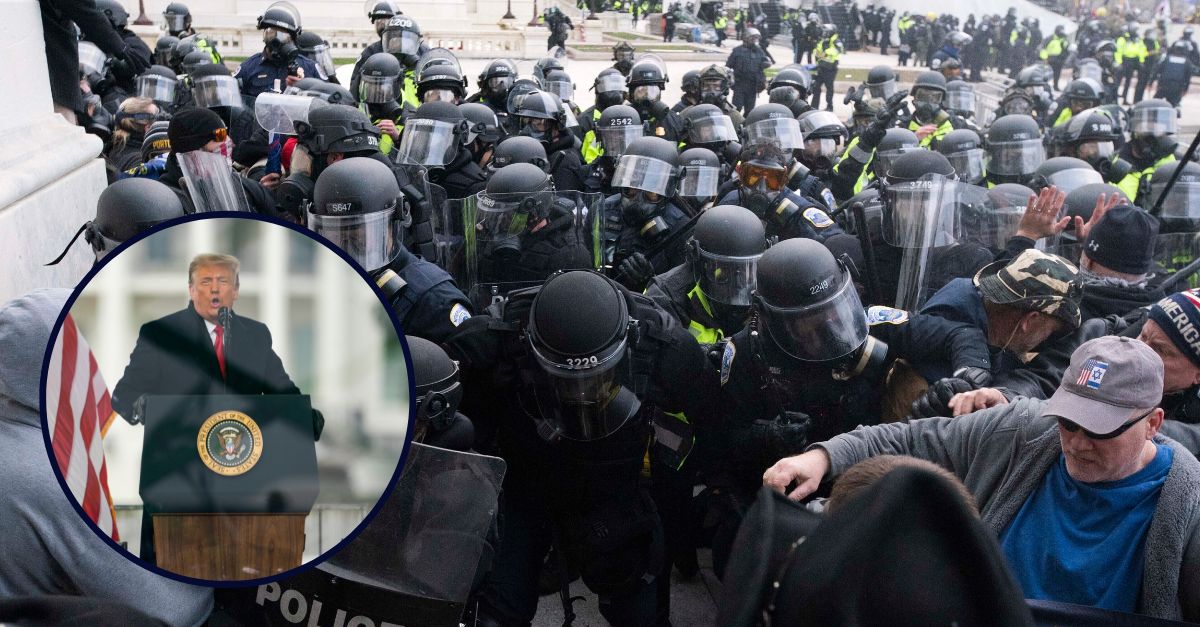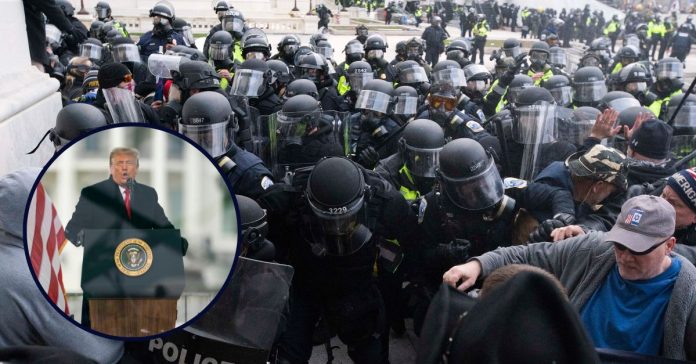
Background: In this Jan. 6, 2021, file photo, U.S. Capitol Police push back rioters trying to enter the U.S. Capitol in Washington. (AP Photo/Jose Luis Magana, File). Inset: President Donald Trump speaks during a rally protesting the Electoral College certification of Joe Biden as President in Washington, Jan. 6, 2021. (AP Photo/Evan Vucci, File.)
For the second time in a month, the appeals court in Washington, D.C., has ruled once again that Donald Trump is not immune from lawsuits brought against him by police officers who defended the Capitol on Jan. 6, 2021.
On Dec. 1, three judges on the U.S. Court of Appeals ruled against Trump in a case brought by Capitol Police Officers James Blassingame and Sidney Hemby, as well as lawmakers including Reps. Eric Swalwell, D-Calif., and Bennie Thompson, D-Miss. Thompson is the former chairman of the now defunct House Select Committee to Investigate the Jan. 6 Attack on the U.S. Capitol. The parties sought to pin civil liability on Trump for the destruction they say he wrought on Jan. 6; the officers in particular sought roughly $75,000 apiece in damages.
They first launched the lawsuit in March 2021 claiming that Trump’s lies about election fraud culminated in a deadly breach of their workplace, scores of physical and emotional injuries, suicides among officers, and more.
Trump’s actions were not covered under the umbrella of his “official acts” as president nor under broad protections afforded to him by the First Amendment, they argued.
And on that point, the appeals court mostly agreed.
Now, in a ruling released Friday, the appeals court echoed those same sentiments and concluded that a different lawsuit first brought in August 2021 by USCP Officer Conrad Smith and seven of his colleagues, was virtually “indistinguishable” from the Blassingame case.
“The salient question in Blassingame, we explained, was instead whether President Trump’s alleged actions reasonably could be understood as official functions of the presidency, in which case official-act immunity would attach, or, alternatively, whether they reasonably could be understood only as re-election activity, in which case it would not,” Friday’s per curiam order states. “This case is indistinguishable from Blassingame in all relevant aspects.”
Trump failed to convince the appellate court that his commentary up to and on Jan. 6 was part and parcel of his official duties to share “matters of public concern,” the court found, and upon closer inspection, the claim simply “bears no inherent connection to the essential distinction between official and unofficial acts,” the court wrote on Friday.
Local rules for the D.C. Circuit allow Trump to request a rehearing on the matter with the full panel of judges on the U.S. Court of Appeals. Attorneys for Trump as well as for Officer Smith did not immediately return a request for comment to Law&Crime on Friday afternoon.
In the nearly three years since Jan. 6, several similar lawsuits have been launched by officers seeking recompense from the former president for what they say were his violations of the Ku Klux Klan Act, a Reconstruction-era law meant to punish conspiracies to interfere with civil rights. Notably, this is the law undergirding Trump’s fourth charge in his criminal election subversion indictment in Washington, D.C.
Trump has attempted to dismiss the officer lawsuits routinely but by and large, judges have refused this bid, finding that his claims of absolute immunity from lawsuits were unsupported.
Have a tip we should know? [email protected]

